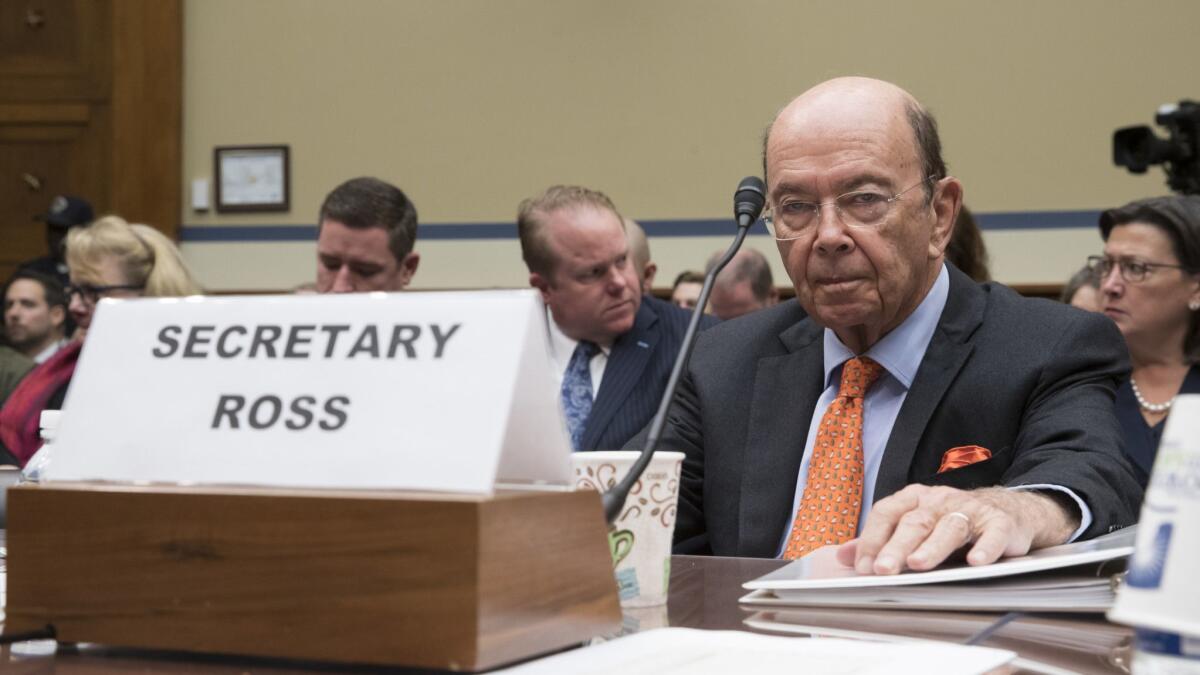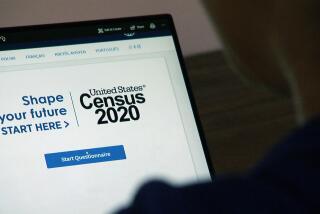Op-Ed: Questioning Californians’ citizenship is no way to conduct an accurate census

The 2020 census is a high-stakes operation for California and Los Angeles County. The decennial population count will have a significant impact on our pocketbooks and our political clout for years to come.
The census is mandated by the U.S. Constitution and conducted every 10 years. It is an “enumeration,” a count of everyone in the United States, not just citizens, and it is used to allocate seats in the House of Representatives and billions of dollars in federal funding.
The Census Bureau has been preparing for the 2020 count since 2008, conducting careful and costly research to develop the questionnaire that will go to every address, delivered by hand by census workers in some cases. Because the every-10-years count is meant to be a snapshot of the whole population, household by household, getting a response rate as close to 100% as possible is the bureau’s first goal. Before the bureau adds a question to the census form, it tests for clarity — does the question elicit the right information? — and compliance.
After the 2010 census, California was deemed eligible for more than $76 billion in federal funding.
In March, U.S. Commerce Secretary Wilbur Ross suddenly announced that a contentious question would be added to the 2020 questionnaire, despite the fact there would be no time to test it: Is every member of each household a U.S. citizen? The Trump administration claims the responses would help in enforcing voting rights laws, but documents and emails released recently reveal that political motives likely fueled the decision.
In one of the just-released documents, the Census Bureau’s chief scientist John Abowd told the administration that adding such a question would be “very costly” and would “harm the quality of the census count” because households would fail to respond. Ross, in a congressional hearing in October, admitted: “One of the problems with adding questions is it reduces response rates.” And since the beginning of Trump presidency — in other words, even before the announcement of the added citizenship question — field testers have reported increased fear, discomfort and falsification of answers among people asked to respond to census questions.
California, and especially diverse Los Angeles, already faces an uphill climb in achieving a full and accurate count of its population every 10 years. L. A. County has a disproportionate number of “hard to count” populations: youth, low-income families and 3.5 million immigrants (an estimated third of whom are undocumented). Some of these individuals move among households, some will require census forms in a language other than English, some won’t cooperate because they don’t trust that the information will be kept confidential as promised, and some simply avoid all contact with the government.
Even a slight undercount could have major ramifications in California. Current population projections show the state either holding on to its current number of congressional seats or losing one seat by just 47,642 people. And if hard to count residents aren’t accurately enumerated, it would most likely shift political power from more diverse districts to less diverse parts of the state.
Enter the Fray: First takes on the news of the minute from L.A. Times Opinion »
After the 2010 census, California was deemed eligible for more than $76 billion in federal funding. Those funds paid for health services, highway construction, disaster relief, housing, Head Start preschool, foster care and special education, among other programs. An undercount would put critical services at risk in jurisdictions across the state.
Los Angeles County has joined the state of California in a lawsuit to fight the decision to add a citizenship question to the 2020 census.
The government has set Aug. 7 as the deadline for public comment on the addition of the citizenship question and other aspects of the 2020 census design. As Californians and Americans you should make your voices heard to overturn Ross’ decision. NALEO Educational Fund, working with other groups, has set up an online portal to help individuals submit comments telling the Commerce Department to withdraw the new question from the 2020 census. Your participation can make a difference in your life, and in the life of the city, the state and the nation.
Hilda Solis is a Los Angeles County supervisor. Arturo Vargas is the chief executive officer of the NALEO Educational Fund.
Follow the Opinion section on Twitter @latimesopinionand Facebook
More to Read
A cure for the common opinion
Get thought-provoking perspectives with our weekly newsletter.
You may occasionally receive promotional content from the Los Angeles Times.






